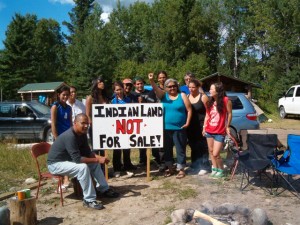Grassy Narrows Today
August 1, 2011
An independent audit of logging in the, 964,000 hectare, Whiskey Jack Forest, from 2004-2009, just released by the province of Ontario, confirms what the community of Grassy Narrows has been saying for a decade; the forest has been mismanaged and is in decline.
The unfortunate reality is that logging is about to resume in Grassy territory. Weyerhaeuser will soon be harvesting from the Whiskey Jack, despite the results of this audit, to supply the Kenora, Ontario, mill that makes Weyerhaeuser iLevel Trus Joist Timberstrand Laminated Strand Lumber (LSL).
The report contains a staggering 21 recommendations to address material “non-conformances to a law and/or policy” and “a significant lack of effectiveness in forest management activities,” [pg.2 p. 1i]. The report concludes that “forest sustainability…will not be achieved unless corrective measures are immediately taken [p.1ii].
Grassy community members have been engaged in the longest standing blockade in Canada, at Slant Lake near their reserve, since 2002, when they stood in front of logging trucks to protect their lands from further logging. Their position has been clear from the beginning. There has been too much taken with little, or no, consideration for regeneration and sustainable harvest.
The auditors report that the longstanding dispute between Grassy Narrows First Nation and the Ministry of Natural Resources (MNR) “cannot be resolved without…relinquishing significant authority to the First Nation to manage portions of the Whiskey Jack forest according to the desires of the GNFN community.”
“This report is further evidence that the Whiskey Jack forest has been degraded by forest companies who have disregarded the minimum standards set out by the Ontario MNR”, said Susanne McCrea, of the Boreal Forest Network. “What people need to know is that even if these provincial standards were followed to the letter huge clear cuts would still be allowed on Annishinaabe traditional territories, further destroying a way of life people have practiced for thousands of years. They have to realize forests can’t recover if they’re harvested this carelessly. They’re leaving nothing for the future.’
While three First Nations (Whitefish Bay, Wabauskang and Wabaseemoong) have participated in the 2009-2012 plan for the Whiskey Jack, Grassy Narrows rejected invitations to the Contingency Plan Planning Team.
The contingency plan will allow many clear cuts over 260 ha in size. According to the Whiskey Jack forest management plan, 324,000 cubic meters of poplar and birch is allocated from the Whiskey Jack Forest Management Unit each year to supply the Weyerhaeuser Timberland/Trus Joist Kenora mill. This is 42 percent of the total allocated timber harvest from the Whiskey Jack and a full 50 percent of the wood supply for the mill.
“The best way we can support the blockaders at Grassy Narrows is to not buy products from Weyerhaeuser,” said Susanne McCrea. “Corporations have to listen to the people they sell to, if to no on else. Governments don’t often stand up to them, but we can stand with the people of Grassy Narrows.”
For the full audit report see this link
http://www.mnr.gov.on.ca/en/Business/Forests/1ColumnSubPage/STEL02_167055.html







Leave a comment